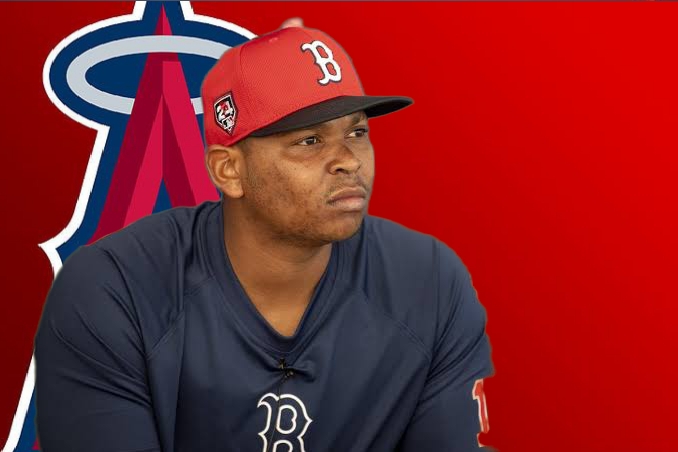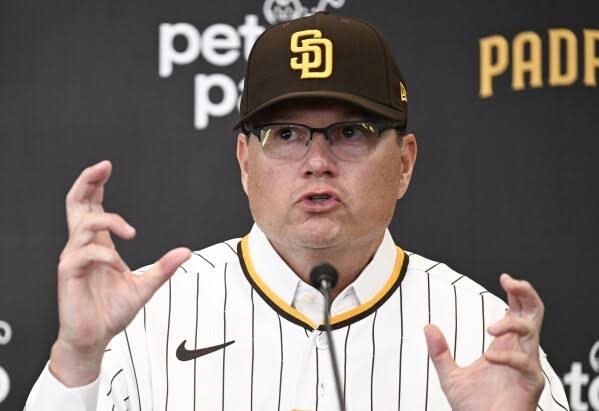“I’M LEAVING”: Rafael Devers Accepts $98.5 Million to Depart from Red Sox and Fully Commit to Los Angeles Angels
In an unexpected and stunning development that has sent shockwaves through the baseball world, Rafael Devers, the Boston Red Sox’s cornerstone third baseman, has agreed to a massive $98.5 million deal with the Los Angeles Angels. This agreement signifies not only a dramatic shift in the trajectory of Devers’ career but also underscores a pivotal moment in the ongoing transformation of both the Red Sox and the Angels. In this comprehensive breakdown, we explore how this deal came to be, its implications for both franchises, and what the future holds for the All-Star slugger.
For the better part of the last few seasons, Rafael Devers had been the face of the Boston Red Sox. Known for his impeccable hitting ability, consistently driving in runs, and fielding with a rare blend of power and finesse at third base, Devers has been one of the most reliable and feared hitters in the American League. However, the sudden departure from Boston, where he had spent the entirety of his major league career, is a decision that raises more questions than answers.
Despite the Red Sox’s reputation as one of baseball’s most storied franchises, the team has been mired in a period of transition in recent years. After a disappointing 2023 season that saw Boston miss the playoffs, many were left wondering about the team’s direction. With ownership hesitant to make a significant commitment to upgrading the roster and a front office in flux, Devers, who was eligible for a new contract extension, found himself at a crossroads.
By mid-2024, rumors began to swirl that Devers was frustrated with the team’s lack of urgency in building a competitive roster around him. Sources close to the player hinted that Devers wanted a change of scenery, especially after seeing other star players in the league sign lucrative deals with contenders. The desire for stability, championship aspirations, and a bigger platform to showcase his talents led Devers to entertain offers from other organizations. The Angels, with their mix of star power—highlighted by Shohei Ohtani and Mike Trout—quickly became an attractive option.

The Los Angeles Angels have long been a team with immense potential, yet they have consistently struggled to put together a winning formula. Despite having two of the most dynamic players in the game—Ohtani and Trout—on their roster, the Angels have been unable to build a competitive team capable of contending for a World Series. Ownership, under Arte Moreno, has frequently been criticized for failing to surround their stars with adequate talent.
However, the allure of joining the Angels wasn’t lost on Devers. A team in desperate need of a true middle-of-the-order hitter, Devers would fill a massive void for the Angels, providing them with a consistent and potent bat that can anchor the lineup. The prospect of playing in a high-profile market like Los Angeles, with all the associated media exposure, also played a role in his decision.
The Angels’ pitch was simple but compelling: “Come join a team on the rise, with the best player in the world (Trout) and the most unique talent in the game (Ohtani). Together, we can turn this franchise into a contender.” For Devers, the prospect of playing with those two stars, as well as the opportunity to step into a leadership role on a team that was expected to be built around him, was enticing.
When the deal was finally made official, Devers expressed his excitement in a statement, saying, “It’s a new chapter in my career. I’ve always wanted to be part of a winning team, and I believe that the Angels are on the verge of something special. I’m ready to contribute and help bring a championship to this city.”
Devers’ contract with the Angels is a 5-year, $98.5 million deal, with an opt-out after the third season. The structure of the contract provides both Devers and the Angels with flexibility: Devers will earn $19.7 million per year over the first three seasons, with the final two years escalating to $30 million annually. The opt-out clause gives Devers the opportunity to test free agency after 2027, which would align with the expected continuation of the Angels’ window of contention.
The contract also includes several performance-based incentives, rewarding Devers for individual accomplishments like MVP voting finishes, All-Star appearances, and milestones such as home runs and RBIs. This gives the player the potential to increase his earnings further, aligning his financial incentives with his performance on the field.
In a rare move, the Angels also gave Devers a signing bonus of $10 million, demonstrating their commitment to ensuring he feels valued and appreciated from day one. The timing of the deal, just before the 2024 trade deadline, also sends a message to the rest of the league: the Angels are all-in for a championship in the near future.
The Red Sox’s loss of Devers is nothing short of catastrophic for the franchise. Not only is Devers one of the game’s premier talents, but he also provided a sense of identity for the club in a time of upheaval. The Red Sox now find themselves in a position where they need to rebuild their roster around young, unproven talent. While Boston still has a solid core, including emerging stars like Jarren Duran and Tristan Casas, the absence of Devers will undoubtedly leave a hole in their lineup.
In the short term, the Red Sox may look to fill the void with a combination of trade acquisitions and internal promotions. However, the departure of Devers raises significant questions about the Red Sox’s long-term vision. Will they continue to be a major player in the free-agent market? Or is this the beginning of a lengthy rebuild?
The loss of Devers also serves as a reminder of the financial struggles that have plagued the team in recent years. With the team unwilling to meet Devers’ demands for an extension and the ongoing uncertainty surrounding ownership and management, the Red Sox may find it difficult to retain top talent in the future.
For the Angels, this acquisition represents a new era. No longer will they be solely reliant on the individual brilliance of Ohtani and Trout. By adding Devers, they’ve bolstered an already potent offense and given themselves the flexibility to improve other areas of the roster. The Angels are now poised to make a serious run at the postseason, with a balanced and deep lineup that can compete with the best in the league.
However, as with any high-profile acquisition, the pressure will be on Devers to live up to his contract and expectations. The Angels’ championship window is now wide open, but whether Devers can help push them over the top remains to be seen.
Rafael Devers’ departure from the Boston Red Sox and subsequent signing with the Los Angeles Angels marks a seismic shift in the landscape of Major League Baseball. For the Red Sox, it’s the loss of a generational talent and a major setback in their efforts to contend in the immediate future. For the Angels, it’s the addition of one of the game’s most dynamic players and a bold statement of their intent to finally build a championship contender around their stars.
Only time will tell if Devers’ move to Los Angeles will be the spark the Angels need to become a true powerhouse. But one thing is clear: the balance of power in the American League may have just shifted.



